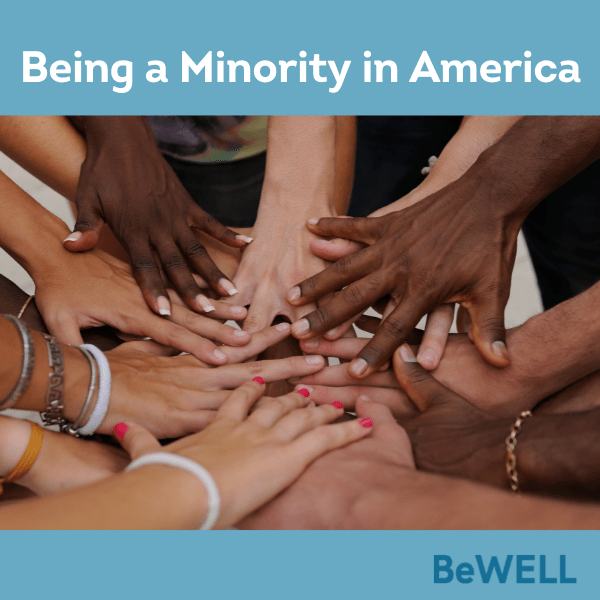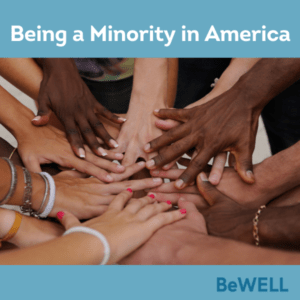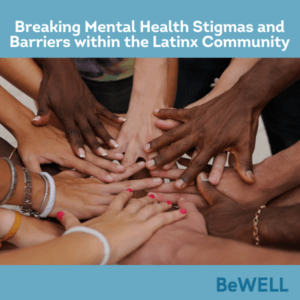A Discussion with Suhailey Núñez, LMHC
Growing up, many of us are taught to believe that in order to be successful in this life we must focus on bridging all of the gaps between who we are, and what we believe society wants us to be. That internal dissonance can grow to be deafening, and sometimes being complaint can feel easier….safer. We follow the rules and dedicate ourselves to climbing up the proverbial ladder with the hope that one day we will be able to defeat the odds and be our own success story. After all, we are all equally capable of success if we just work hard, right? Sadly, I now recognize how loaded of a question that is.
Being a minority in America has taught me a lot about my own voice and the power that lies within it. It has taught me what true resiliency in the face of adversity looks like as we continue to struggle to balance the dualities of our worlds and identities. It is within these moments where I feel such a close bond with other members of this community. Yet, I must recognize that we also have incredibly unique and different experiences independent from one another within the community.
Minority Mental Health Awareness
When we speak about the struggles that minorities are faced with, especially mental health and spreading awareness, we must mention the name Bebe Moore Campbell. She was an African American journalist, author, and advocate for mental health education among diverse communities. She dedicated her life to fighting for the de-stigmatization of mental illness and equitable mental health services and treatment, encouraging people at news conferences, churches, and even book signings to get regular checkups with their mental health providers. She passed away in 2006 due to cancer, but not before laying the foundation for what would soon be known as National Minority Mental Health Awareness Month. With the continued push from her friends and family, the US House of Representative announced in May of 2008 that moving forward July would be recognized as Bebe Moore Campbell-National Minority Mental Health Awareness Month.
Why Do We Need a Whole Month?
According to the U.S Department of Human Health and Human Services, racial and ethnic minorities make up one-third of the American population. So, we are often asked: Why should there be a special month to recognize this growing community? If their needs are so important, shouldn’t they be recognized every day as opposed to watering it down to a month? While it is true that support and education should always be provided due to the struggles within the minority community being experienced on a continuous basis, having a National Minority Mental Health Awareness month contributes to the necessary isolated moments of reflection. Having a month of recognition instills hope and aims to expand on the appreciation and understanding of minority culture, as well as providing a more focused spotlight on the experienced mistreatment stemming from immigration policies, laws that disproportionately affect the community and their access to quality mental health care. Until the barriers that are faced in the world today are permanently eradicated, spaces for recognition and acknowledgement will continue to be vital.
The Invisible Barrier
Mental illness can be experienced by anyone regardless of one’s background, and anyone can benefit from taking care of their mental health. However, that same background and identity can pose as a barrier to accessing certain resources, making quality mental health treatment difficult. We are all so beautifully unique, yet these differences and idiosyncrasies can and do play a role on how we experience the world and approach certain mental health concerns. More and more professionals are being encouraged to seek continued training and education for cultural competency as a way to increase effectiveness of treatment, with providers learning how to take into consideration the totality of a person when decision making in treatment, including the patient’s linguistic needs, their values, experiences, beliefs, preferences, familial expectations, and overall cultural norms.
Within minority communities, studies have proven that there is a higher level of stigma surrounding mental health treatment due to the likelihood of being perceived as weak for struggling. In certain cultures, it can be viewed as a sign of disrespect to seek help outside of the family and share personal information to others, as well as the infamous “crazy” label for seeing a therapist or being on any form of psychotropic medication. Language barriers are an issue as it can discourage people from seeking treatment due to the frustration of things getting lost in translation regardless of the use of translators. Many who are undocumented even fear deportation, with the assumption that accessing certain resources like mental health care will create a paper trail leading to immigration. Additional barriers like lack of insurance or poor health insurance, misinformation about mental health, difficulty recognizing early signs of mental illness due to chief complaints being somatic symptoms, little diversity among mental health providers, and a distrust in the healthcare system due to multiple historical examples of exploitation by researchers and doctors (i.e The Tuskegee experiments, 19th century doctor J. Marion Sims making advancements in gynecology at the expense of enslaved black women, cases of forced sterilization, etc.) are only some examples of unfair differences to accessing quality care among minorities.
Mental Health Concerns Within the Minority Community
According to the American psychiatric association, older Hispanic adults and Hispanic youth are especially vulnerable to psychological stresses associated with acculturation, with an uninsured rate of 21.2% compared to 7% of white non-Hispanic Americans. Studies have shown that African Americans tend to be frequently misdiagnosed with schizophrenia rather than a mood disorder in comparison to white individuals who have reported the same symptoms. It is believed that this pattern of misdiagnosing may partially be due to differences in how African Americans express symptoms of emotional distress, shedding light yet again on the importance of providers being culturally competent and catering treatment to the specific needs of their clients. Their uninsured rate is at 11%, with higher death rates for HIV, cancer, diabetes, heart disease, stroke, asthma, pneumonia, and homicide in comparison to white individuals. American Indian and Alaska Native Population are believed to have the highest poverty rate of any race or ethnic group, with 26.6% living in poverty. 21% of their population over the age of 18 report mental illness in comparison to 17.9% for the general population, with their children and adolescents having the highest rate of major depressive episodes when compared to any other ethnic or racial group. Much of this can stem from intergenerational historical trauma. Their uninsured rate is 21%. Asian Americans and Pacific Islanders were reported to be the least likely to seek mental health treatment in comparison to other racial or ethnic group, with 70% of their refuges who do seek mental health treatment being diagnosed with post-traumatic stress disorder due to immigration. Their uninsured rate is at 7.5%. These discrepancies are impossible to deny, and with the covid pandemic affecting people’s physical health as well as their mental health, the reduced access to quality mental health care may continue to hinder the minority community.
Bridging the Gap
Working together can be immensely helpful in reducing the disparities in mental health care seen among minorities. Policymakers play a large role by continuing to support legislation and policies that address these concerns, one example being the U.S. Department of Health and Human Services (HHS) Action Plan to Reduce Racial and Ethnic Health Disparities. Professional providers must continue seeing the value in educating themselves on cultural competency, understanding how personal biases and assumptions can impact treatment provided to their clients, and work on empowering their clients to receive the mental health care they deserve. Integrative care is and will always be crucial, combining primary care with mental health care to emphasis the importance of addressing all needs equally. The hope is that our complexities will no longer be seen as an inconvenience, but that we will reach a time when it will be universally accepted as an asset.
Located in Hoboken and Midtown Manhattan, our BeWELL therapists are well learned in a variety of fields and are here to help you become your best self. Whether you are struggling with issues related to Anxiety, Depression, Sexual Orientation, Race and Identity, school, or relationships, BeWELL therapists welcome you with an open ear.
References
American Psychiatric Association. (n.d.). Mental Health Disparities: Diverse Populations.
Retrieved from https://www.psychiatry.org/psychiatrists/cultural-competency/education/mental-health-facts
Kreps, Gary L. (2017) “Stigma and the Reluctance to Address Mental Health Issues in Minority
Communities,” Journal of Family Strengths: Vol. 17 : Iss. 1 , Article 3.
Williams D. R. (2018). Stress and the Mental Health of Populations of Color: Advancing Our
Understanding of Race-related Stressors. Journal of health and social behavior, 59(4), 466–485. https://doi.org/10.1177/0022146518814251





